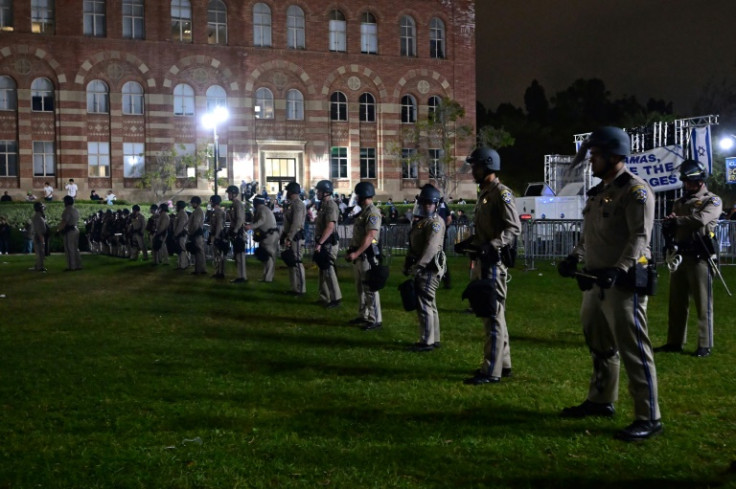
Police deployed a heavy presence on US university campuses Wednesday after forcibly clearing away some weeks-long protests against Israel's war with Hamas.
Dozens of police cars patrolled at the University of California, Los Angeles campus in response to violent clashes overnight when counter-protesters attacked an encampment of pro-Palestinian students.
At Columbia University in New York City, which has been the epicenter of the demonstrations, police were on standby after officers marched onto campus late Tuesday to end the protests there.
The sight of helmeted police at two of America's most prestigious universities left some students dismayed.
"I don't think we should have a heavy police force on campus," UCLA student Mark Torre, 22, told AFP as he surveyed the scene from behind metal barriers.
"But more and more, day by day, I think it's a necessary evil, to at least keep safety on campus."
At Columbia and at the City University of New York, where police cleared demonstrators out overnight, some students decried "rough and aggressive" tactics used by officers.
"We were assaulted, brutally arrested. And I was held for up to six hours before being released, pretty banged up, got stomped on, got cut up," one CUNY student who gave his name only as Jose told AFP.
A medical student offering treatment to student detainees as they were released described a litany of injuries.
"We've seen things like severe head traumas, concussions, someone was knocked unconscious in the encampment by police, someone was thrown down the stairs," the student, who gave her name as Isabel, said.
About 300 arrests were made at Columbia and CUNY, Police Commissioner Edward Caban told a news conference Wednesday.
Mayor Eric Adams blamed "outside agitators" for ratcheting up tensions. Students at Columbia have denied that outsiders were involved.
The university's president Minouche Shafik, who has come under fire over her decision to call in police, said Wednesday the turn of events "filled me with deep sadness."
"I am sorry we reached this point," she said in a statement.
Demonstrators have gathered in at least 30 US universities since last month, often erecting tent encampments to protest the soaring death toll from Israel's war in the Gaza Strip.
The protests have posed a challenge to university administrators trying to balance free speech rights with complaints of criminal activity, anti-Semitism and hate speech.
The administration of President Joe Biden -- whose support for Israel has outraged many protesters -- has also tried to walk that line.
"We believe it's a small number of students who are causing this disruption, and if they're going to protest, Americans have the right to do it in a peaceful way within the law," White House Press Secretary Karine Jean-Pierre told reporters.
Biden's rival in the November election, Donald Trump, voiced his full-throated support for the police response at Columbia.
"It was a beautiful thing to watch. New York's finest," he told a rally in Wisconsin.
"To every college president, I say remove the encampments immediately, vanquish the radicals and take back our campuses for all of the normal students."
On Tuesday night, police had entered Columbia's campus and climbed into Hamilton Hall -- barricaded by protesters -- via a second-floor window before leading out people in handcuffs. They also cleared the large tent encampment.
In Los Angeles, fireworks were hurled as counter-protesters sprayed chemical substances onto the pro-Palestinian encampment and attempted to tear down wooden boards and metal barricades before police eventually arrived.
On Wednesday, students on loudspeakers called for demonstrators to keep going at a camp blocking the entrance to one of the school's main libraries, which bore graffiti reading: "Free Gaza."
And students at Fordham University, a Jesuit institution also in New York, launched their own campus protest on Wednesday, according to US media.
Elsewhere, police moved in at the University of Wisconsin at Madison and arrested several protesters, TV footage showed.
Law enforcement in helmets and carrying batons arrived at the University of Texas in Dallas and began taking down parts of a student encampment there, according to TV images.
The Gaza war started when Hamas militants staged an unprecedented attack on Israel on October 7 that left around 1,170 people dead, mostly civilians, according to an AFP tally of Israeli official figures.
Israel's retaliatory offensive has killed more than 34,500 people in Gaza, mostly women and children, according to the Hamas-run territory's health ministry.








